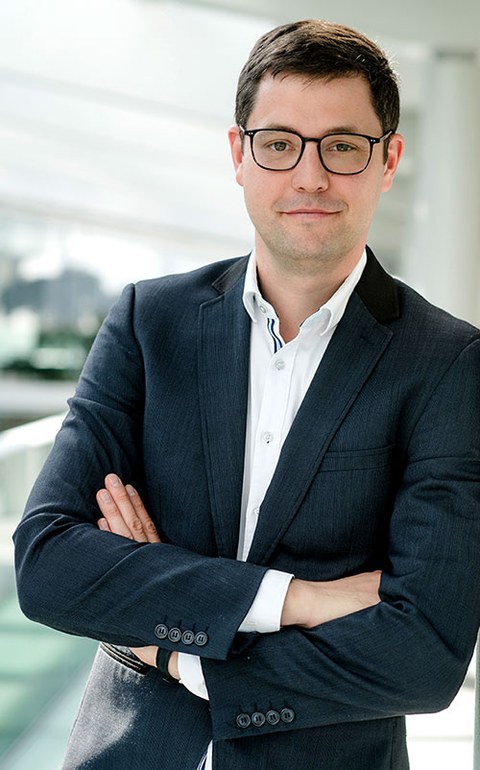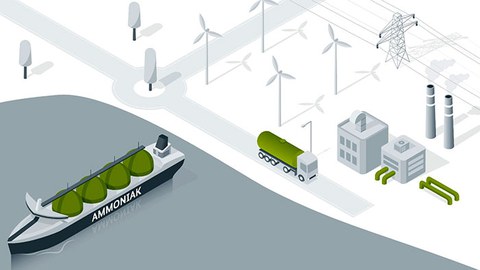Liaising between science and policy for green gases
(Profile from 2022)
Dagmar Möbius
Philipp Hauser was interested in many things as his high school years drew to a close: history, philosophy, political science. Finally, a chat with an acquaintance inspired him to study industrial engineering. After many years at TU Dresden, he joined VNG AG in Leipzig as a consultant on scientific studies in 2021. The current situation in Europe illustrates the relevance not only of his work, but also of the subject of his doctorate.

Philipp Hauser
“In school, we were taught that many processes in everyday business fail because of communication problems between engineers and economists. Approaching issues from the perspective of two different worlds, acting as a link between them, and understanding both, appealed to me. In the course of the energy transition, it has become clear that it is essential to consider both sides,” says Philipp Hauser, explaining his decision to study. Born in Zeitz, he grew up in Saxony-Anhalt and considered pursuing a degree in either Leipzig or Dresden after completing his civil service alternative to military service (Zivildienst). Ultimately, he chose Dresden – for personal reasons. “My girlfriend had started studying water management in Dresden the year before me.”
Between 2008 and 2014, Philipp Hauser completed both a Bachelor’s and a Master’s in industrial engineering at TU Dresden. “During my Bachelor’s, I spent a lot of time on campus, and between lectures we liked to go to the canteen or to the ‘Bierstube’ pub.” The Business and Economics building, the Schumann-Bau, left a lasting impression on him. “It’s a special place on campus where you can feel both the past and the present, and it’s a fun place to learn.” However, he did find some of the technical subjects difficult. Electrical engineering and math, for example. “I wasn’t the only one,” he says with a smile, recalling not just a few fellow students who repeatedly failed the sixth semester exams. In the Master’s program, there were sometimes only three in the class. An “exotic subject” is what Philipp Hauser jokingly calls the less popular seminars for prospective industrial engineers. Visits to companies in the energy industry gave students a real taste of practice. Alongside what he learned about the energy industry and energy technology, abstract thinking, structure, and organizational and other skills he acquired at university also help him every day in his professional life.

The economists are now located in the Hülße-Bau building.
After graduating, Philipp Hauser worked as a research associate at the TU Dresden Chair of Energy Economics under Professor Dominik Möst until the end of 2020. The focus of his research was on the convergence of electricity and gas networks, modeling the European gas market and mapping uncertainties in energy system analysis. He was also responsible for methodology and content in externally funded projects for the German Federal Ministry for Economic Affairs and the European Commission. He regularly presented research findings in publications and at academic conferences. Hauser’s doctorate, which he will soon be defending, analyses the European gas market. He is convinced that, “in the long term, green hydrogen offers a sustainable alternative to fossil natural gas.”
Since 2021, Philipp Hauser has worked for VNG AG in Leipzig as a consultant on scientific studies in the green gas sector. He found the job through the business platform XING. “It was a great fit,” he says happily. His work in the Green Gas department focuses on the development of the German and European hydrogen market. “We are seeing huge changes in the regulatory environment,” he explains. “A lot of things still need to be adapted and regulated.” Different approaches need to be assessed and the right approach defined. “The energy transition needs experts,” believes Philipp Hauser. “Politicians can no longer simply follow their gut feeling.” They need people like him, who have knowledge of science, economics, and politics. His expertise in research and academic writing serves him well, as do his communication skills. “Within the company, I’m a kind of explainer, translating studies, sharing results, and managing knowledge so that not it’s accessible to more than just those who are specialists in the field.”

BMBF flagship hydrogen project TransHyDE
One example of his employer’s work is the “Energiepark Bad Lauchstädt” hydrogen project. In Central Germany, the project partners seek to test the production, storage, transport and efficient use of green hydrogen in real-life conditions on an industrial scale, and turn the region into a pioneering center for hydrogen with strong technological expertise. The project is funded by the Federal Ministry for Economic Affairs and Climate Action (BMWK) as a living laboratory for the energy transition. The company is also involved in the Federal Ministry of Education and Research’s (BMBF) flagship hydrogen project TransHyDE.
Philipp Hauser is not the only TUD alumnus at VNG AG in Leipzig. In his department alone, there is another industrial engineer and a former fellow student from the Boysen Research Training Group. Hauser is in regular contact with chairs at TU Dresden. “That’s how new partnerships are born,” he says.
Contact:
Philipp Hauser M. Sc.
Referent wissenschaftliche Studien
VNG AG
Braunstraße 7
04347 Leipzig
Tel.: +49 341 4432962
Email
